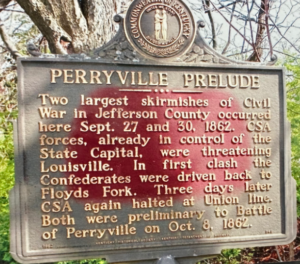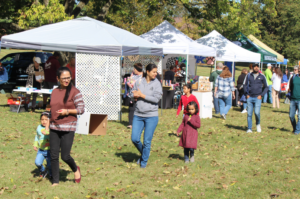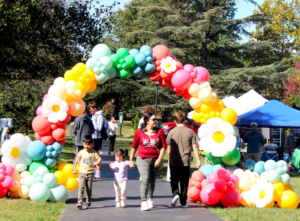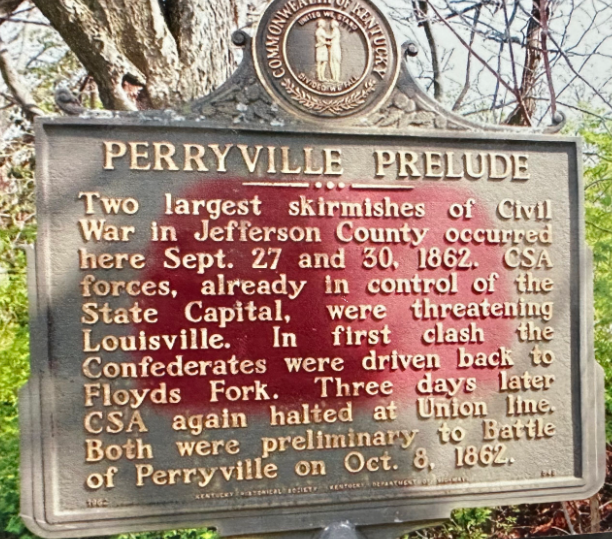Douglass Hills’ 50th Anniversary Prompts Reflections on Area’s Historic Significance
Photography Provided
On some early mornings these days, a misty fog might settle in along Burnley and Burnsdale roads, the paths leading from Shelbyville Road into the City of Douglass Hills. But the thick fog spreading out in that very same location on September 27 and 30 in 1862 would have been the acrid smoke from rifled muskets and Colt revolvers, fired by Union and Confederate soldiers. 
That’s right. Where a 50-year-old suburban city stands today was the scene of the two largest skirmishes of the Civil War in Jefferson County. A historical marker on U.S. Highway 60 in front of Douglass Hills notes that the skirmishes became known as the Perryville Prelude.
Confederate forces, already in control of the State Capitol, were threatening Louisville. In the first clash, Union forces pushed the Confederates back to Floyds Fork. Three days later Confederate forces were again halted at the Union line.
Louisville was safeguarded from the Confederates and both sides moved deeper into Kentucky where, on October 8, 1862, the Battle of Perryville occurred. It was the most destructive Civil War battle in Kentucky, leaving more than 7,600 killed, wounded or missing.
That bit of Civil War history is just one of the significant connections to the past that emerged as the City of Douglass Hills officials researched the background of the land on which their homes were built, in preparation for the city’s 50th anniversary celebration on Saturday, October 7.
A history display was created for the celebration, showing the interesting connections Douglass Hills has to the area’s past. A time capsule filled with 2023-era items will be buried near the city’s Faye Tanner Gazebo in Warren Walker Park as part of the acknowledgement of Douglass Hills’ founding in 1973. The time capsule will be opened in 25 years.
“It’s important to preserve history and ensure that our unique bonds with the past are known in Douglass Hills and throughout Louisville Metro,” says Douglass Hills Mayor Bonnie Jung. “I think a lot of people are surprised when they realize how our community has such fascinating ties to the past.”
Consider the storied life of Douglass Hills’ namesake J.J. Douglass, a 19th-century horseman, landowner and whiskey producer. Born in Louisville in 1840, Douglass’ mansion sat atop the hills facing what is now U.S. Highway 60, just above the location of a historic springhouse, the last remaining part of the 400-acre farm he called Douglass Place and, later, Ethen Stock Farm.
Douglass, whose name also was spelled Douglas, was known as a grand host who welcomed out-of-state horsemen and others to his home, where they were graciously entertained.
His involvement in horse racing led to the opening of Douglas Park Racetrack in 1895 as a trotters’ racetrack. It was located in the Beechmont neighborhood in South Louisville. Eventually Douglas Park became a thoroughbred racing venue, which drew national attention as home of the renowned Kentucky Handicap. In 1919 the track became part of the Kentucky Jockey Club and was controlled by Churchill Downs. It served as an exercise and training track for Churchill Downs, and its stables accommodated any overflow of thoroughbreds.
Churchill Downs began selling off the Douglas Park property in 1954. By 1958 the park no longer existed. Businesses, homes and apartments now stand on the Douglas Park site. Douglass Hills’ namesake made lots of money in horse racing, and also in the whiskey business. His J.J. Douglas Co. was not a distiller, but a blender of whiskeys. The company had a presence on the famed Whiskey Row on Main Street in downtown Louisville. The company had a dozen or so whiskey labels and varieties, with Jim Douglas Whiskey as its flagship brand.
Douglass died on January 2, 1917, at his home. Well-known Louisvillians were among his pallbearers, including brothers Louis and Otto Seelbach, founders of the Seelbach hotel.
History keeps calling on Douglass Hills as its 51-year-old Douglass Hills Hurricanes swim team has amassed many victories and champion swimmers through the years. The Hurricanes won the Louisville Swim Association championship in 2023, as well as many years prior. The Hurricanes have had several champion-level swimmers through the years.
However, perhaps Douglass Hills’ two greatest claims to fame are Olympic swimmers Brooke Forde, who won a silver medal in the 2020 Olympics in Tokyo, and Leigh Ann Fetter-Witt, who competed in the 1988 Olympics in Seoul, South Korea.
“I am so proud of our swim team,” says Jung. “For over half a century the swimmers in Douglass Hills have worked hard to build a legacy that brings positive attention to our city. I get so excited when I’m at the meets and watch these young athletes give their all.”
It was a labor of love for Douglass Hills officials to put on the 50th anniversary celebration in October. Hundreds of Douglass Hills families showed up for the event, which featured a police helicopter, fire trucks, an electric vehicle display, live music, food vendors, inflatables and other children’s activities.
With 1973 as its founding year, Douglass Hills officials chose a 1970s theme for the celebration. Attendees were encouraged to wear their love beads, tie-dyed T-shirts and bell bottoms to join in the fun.
“I am grateful to our hard-working council members and Event Coordinator Jennie Norfleet for ensuring that our anniversary celebration was a success,” says Jung. “Those of us who live in Douglass Hills love our city and are proud to call it home.”






Comments 1
Thank you so much for your wonderful article on our beautiful and historic city of Douglass Hills! We appreciate your showcasing our history.